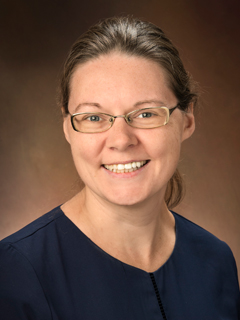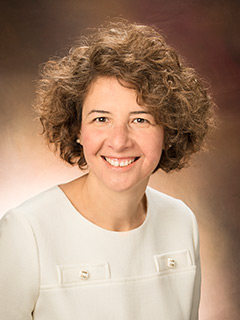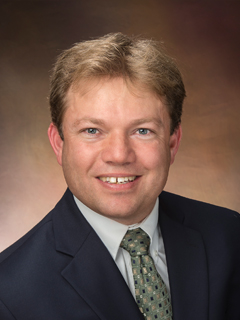HOW CAN WE HELP YOU? Call 1-800-TRY-CHOP
In This Section
Novel Genetic Disorder, ‘Peanut Patch,’ Neonatal Outcomes, Seed Grants

In this week's news roundup, researchers identify a novel genetic disorder, a new study demonstrates effectiveness of the "peanut patch" to treat allergies, Children's Hospital of Philadelphia experts serve as guest editors to highlight global neonatal healthcare, the Pennsylvania Pediatric Medical Device Consortium announces the latest round of seed grants, and the Cell and Gene Therapy Collaborative announces the winning internal grant recipients for the next fiscal year.
Researchers From CHOP and Princeton Discover Novel Genetic Disorder
Scientists from CHOP and Princeton University identified a yet-to-be named genetic disorder that results from rare variants in the mitogen-activated protein kinase kinase kinase kinase 4 (MAP4K4) gene, which affects signaling pathways such as the RAS pathway responsible for normalizing cell growth. Symptoms include craniofacial and neurodevelopmental issues, and after documenting several patients with similar experiences, the team put out an international call for patients who fit the criteria, eventually connecting with 21 families from 36 countries.
"We were able to connect with patients from all over the world who had overlapping symptoms, and eventually we were able to pinpoint the overlapping genes that helped us identify the variants causing these issues," said co-senior author Elizabeth Bhoj, MD, PhD, an attending physician in the Division of Human Genetics at CHOP.
The team worked with a disease model to confirm that variants, identified by CHOP research scientist Dong Li, PhD, were causing the common symptoms. The model demonstrated that decreased MAP4K4 activity led to developmental defects similar to those observed in the patients, and that the mutated gene could restrain signaling in the RAS pathway during embryonic stages.
Dr. Bhoj anticipates this research will help identify how the newly identified genetic variants may influence other diseases. Read more about their findings in this CHOP news release and Science Advances.
Peanut Patch Demonstrates Effective Results in New Study
Approximately 2% of children in the United States and other western countries are affected by a peanut allergy, which is a common cause of pediatric anaphylaxis that can lead to an allergic reaction so severe it could result in death if untreated. Terri Brown-Whitehorn, MD, attending physician in the Division of Allergy and Immunology and co-leader of the Food Allergy Center Frontier Program at CHOP, developed a phase 3 randomized clinical trial to study the efficacy of epicutaneous immunotherapy (EPIT). EPIT involves placing a patch containing a small amount of allergen on a child's back to expose the immune system to a very low level of allergen with much less risk of a systemic reaction.
While EPIT has been shown to be effective in children 4 to 11, Brown-Whitehorn and her team wanted to establish the safety and effectiveness of the patch in the 1 to 3 age group. Three hundred sixty-two patients enrolled in the clinical trial; 244 research participants received the peanut patch. After a year of treatment, swapping out the peanut patch daily, 67% of children wearing the patch could tolerate the single peanut dose, which is equal to 250 mg of peanut protein. At least 64% of those randomized into the interventional patch group could tolerate the equivalent of three to four peanuts. Symptom severity shifted to less severe by the end of the trial.
"Currently there are no FDA-approved peanut allergy treatments for patients under the age of 4, so this study is exciting news," Dr. Brown-Whitehorn said. "Although an allergy patch won't necessarily work for all toddlers, this study shows that it could be one more tool in an allergist's toolbox to help prevent a life-threatening allergic reaction."
Learn more about this study in the CHOP news release.
Global Health Experts Highlight Global Neonatal Healthcare
Andrew Steenhoff, MBBCh, DCH, director of the Global Health Center, and Susan Coffin, MD, MPH, associate chief of the Division of Infection Diseases served as guest editors for the most recent edition of Frontiers in Pediatrics highlighting neonatal health in low- and middle-income countries. The guest editors curated 40 papers covering work in Africa and Southeast Asia, where newborn and neonatal death rates are highest.
Drs. Steenhoff and Coffin also contributed an editorial on the importance of identifying new frontiers in global neonatal health with respect to the SARS-COVID-19 pandemic and climate change, especially in countries where social systems and healthcare settings are inadequately resourced.
"Many interventions designed to improve neonatal outcomes in high-resource settings either cannot be implemented or do not work in low- to middle-income countries," Dr. Coffin said. "Thus, it is essential that research performed in these settings be published and disseminated to accelerate adoption of novel strategies that can make a difference in global neonatal survival."
Drs. Steenhoff and Coffin introduced a broad range of topics, from the improvement of postnatal checkups in Ethiopia to the rise in poor neonatal outcomes due to discharge against medical advice in South Africa and China, to emphasize the challenges that low- to middle-income countries face in achieving scientific equity.
Read more about the studies they highlighted in Frontiers in Pediatrics.
Renowned Pediatric Urologic Oncologist Appointed Chief of Urology Division
Thomas Kolon, MD, has been appointed as chief of the Division of Urology at CHOP. Dr. Kolon's vast expertise covers the care of children with genital disorders and renal, bladder, and prostate cancers with a focus on optimizing organ-sparing surgery through 3-D modeling and preservation of fertility in oncology patients.
He is urology director of the Differences in Sex Development Program at CHOP, a program through which he has garnered NIH R01 funding and has worked extensively in concert with colleagues in endocrinology, genetics, and psychology.
During his 22-year tenure at CHOP, Dr. Kolon acted as secretary of the Executive Committee of the Medical Staff and chair of the Ethics Committee and holds the Howard M. Snyder III Endowed Chair in Pediatric Urology at CHOP.
Learn more in this CHOP news release.
Pediatric Medical Device Consortium Awards Seed Grants
The Pennsylvania Pediatric Medical Device Consortium (PPDC) announced five seed grant awards to support medical device development for children.
Among the awardees is William Fox, MD, an attending neonatologist in the Division of Neonatology at CHOP and leader of the Chronic Lung Disease Frontier Program, for his work in developing drug delivery devices for pediatric respiratory care. His device aims to prevent long-term complications, such as lung trauma and chronic lung diseases, that can occur from the invasive intubation and conventional mechanical ventilation required to treat respiratory diseases in children.
Additional awards will support the development of devices including a continuous, noninvasive respiratory distress monitor, a jaundice assessment tool, an IV infiltration detection wearable, and a monitor to quantify changes in blood volume.
Each project will receive $50,000 to translate their work into commercial medical devices for children. Funded by the United States Food and Drug Administration, the PPDC is a collaboration between CHOP, the McGowan Institute for Regenerative Medicine of the University of Pittsburgh, and the University of Pennsylvania.
Learn more in this CHOP news release.
Cell and Gene Therapy Collaborative Announces Grant Recipients
The Cell and Gene Therapy Collaborative (CGTC) announced Seed and Acceleration Grant recipients for the 2024-2025 fiscal year. These internal grants support CHOP-led cell and gene therapy research, increase the number of potential new pediatric cell and gene therapies that are the product of CHOP-led research, and accelerate the pace of clinical development. The goal is to provide new therapies to children, while fostering collaboration across the many areas of CHOP engaging in cell and gene therapy research and clinical activities.
Seed Grant recipients include:
Elizabeth Bhoj, MD, PhD, and Aaron Black, PhD, who will assess if adeno-associated virus (AAV)-mediated gene therapy will effectively treat TBCK-related encephalopathy syndrome.
Bhavya Doshi, MD, and Lindsey George, MD, who will determine if CD19-targeted therapies will reduce immunoglobin neutralizing antibodies that limit the efficacy of AAV treatments.
Yael Mosse, MD, and Evan Weber, PhD, who will develop CARs targeted to tumor killing in patients expressing the ALK gene, which is responsible for neuroblastoma.
Nikolaos Sgourakis, PhD, who aims to identify novel cancer immunotherapy antigens to enable the development of universal therapeutics.
Sarah Tasian, MD, and Tommaso Balestra, PhD, who will study the in vivo activity of new bispecific TSLPR-targeting CAR T cell immunotherapies in vitro and in vivo in patient-derived xenograft models of CRLF2-overexpressing Philadelphia chromosome-like acute lymphoblastic leukemia to determine if long-term remission is possible.
An Acceleration Grant was awarded to Stefano Rivella, PhD, Adeline Vanderver, MD, and Laura Adang, MD, PhD, for their proposal to develop a gene therapy targeted to treat metachromatic leukodystrophy, a fatal lysosomal storage disease.
ICYMI
Catch up on our headlines from our April 28 In the News:
- Rivella Named Leader of RNA Gene Therapeutics Group
- CAPP+ Works With Community Partners to Reduce Asthma Triggers at Home
- CHOP Informatics Leader Speaks on HIMSS Panel
- Cardiac Center Researchers Identify Tricuspid Valve Differences in HLHS Patients
- Research Indicates Benefits of Earlier, Individualized Autism Interventions
- CHOP and HTS Put Innovative Spin on Traffic Safety
Keep up with our news, stories, and updates in real time by following us on Twitter, LinkedIn, or Instagram. Meet the minds behind the science in the Bench to Bedside podcast. Or subscribe to our newsletter to get an email sent every other Friday by signing up here.








